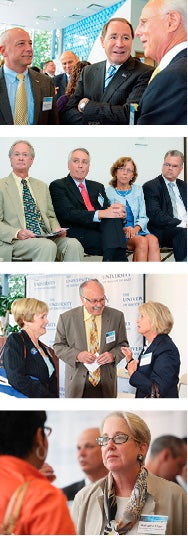Portal to a URI Partnership

Business Engagement Center: noun,
a central portal through which businesses can connect with all facets of Rhode Island’s flagship public university to enhance industry competitiveness, create jobs, conduct important, mutually beneficial research, create a highly trained workforce, and increase philanthropy. A focal point for faculty and students to interact with industry in meaningful and innovative ways.
As increasing numbers of local and regional businesses turn to the state’s flagship institution for consulting expertise, for interns, for skilled workers in fields that demand a rigorous education, and for cutting-edge research in areas ranging from bio-engineering to robotics to aquaculture and more, the message is clear: URI is the right place, at the right time, to launch a center of business engagement.

And that is exactly what the University did on September 5. The choice of GTECH, one of Rhode Island’s most visible business success stories, to officially kick off the Business Engagement Center, was deliberate. “GTECH has already engaged our computer science department and MBA program,” points out Center Executive Director Katharine Hazard Flynn, who also wears the hat of director of corporate and foundation relations at the URI Foundation. In a bit of a surprise twist, GTECH recently sought student interns from the University’s writing and rhetoric program to assist with proposal writing, a growing area of the lottery giant’s business. Additionally, GTECH has worked with URI’s MBA program on three sponsored projects, two in new product development and one in workplace internal process development.
“GTECH is a great example of a company coming in the door thinking they need one thing, like interns, and realizing quickly that we have a great deal more to offer,” says Flynn, adding, “in these cases, one plus one really does add up to three.”
Robert Vincent, GTECH’s senior vice president for corporate communications noted, “The creation of the Business Engagement Center at URI is a major step forward in aligning the University’s resources and mission with the needs of the business community. URI is a large and complex institution with many highly regarded areas of research and academic concentration. Having a Business Engagement Center to assist businesses, particularly small businesses, to better understand and easily access URI people and information is exactly the kind of thing that a public university should be undertaking to improve competitiveness and help grow our local economy.”
So what, exactly, will the Business Engagement Center do that is not already happening in other programs at URI? President Dooley explains it this way. “The new Center is URI’s front door for business. It’s a one-stop shopping model, responding to companies’ needs and operating in real time, at the speed of business.” President Dooley has been impressed with the success of the University of Michigan’s Business Engagement Center and believes that its model will easily translate to URI. “Michigan is the gold standard for this type of initiative,” the president said.
Flynn agrees. “Seven years ago, the University of Michigan started a business engagement center in its engineering school. Today, the University has scaled up its original program to encompass several other state universities. At URI, we can ramp up much more quickly, given our size, our prime location, and the agility of our faculty, students, and staff.” Flynn notes that Michigan has seen the number of companies engaged on campus triple in the past seven years; additionally, industrially funded research support has grown by 36 percent, and corporate philanthropy by 12 percent.
Learn more: uri.edu/bec
![]() University-of-Rhode-Island
University-of-Rhode-Island
![]() twitter.com/@URI_BEC
twitter.com/@URI_BEC
![]() linkedin.com
linkedin.com
Flynn envisions businesses making a phone call or an email inquiry to the Center and having all their needs easily met, thanks to “relationship managers” on staff, and a robust and user-friendly web portal that will contain complete and updated information regarding URI, research, career events, and more. Critical to a positive experience for businesses will be the prompt responsiveness of these BEC relationship managers, who will efficiently navigate through URI’s varied resources and connect the business customer to the appropriate University departments or individuals. This will apply not only to inquiries about internships and research collaborations, but also to requests for use of University facilities and equipment. “The BEC will be a full-service center,” Flynn emphasizes.
URI will not only serve as a resource to local and regional companies, but the reverse will also be true, as natural partnerships evolve and lead to increased hiring of the University’s undergraduate and graduate students in a diverse range of fields. Students will gain the advantage of an expanded network of connections in the business community. Further, URI faculty in disciplines as varied as nursing and oceanography are likely to gain new visibility within the corporate sphere as sponsored research projects shine a light on their expertise and value outside the halls of academia.
URI alumna Laurie White, president of the Greater Providence Chamber of Commerce, was on hand to help announce the new Center. “The holistic approach is very appealing, and very practical,” said White. “This is the right direction for Rhode Island—more collaboration among the sectors that have the potential to grow our economy, with sustainable jobs that give our bright young graduates a reason to stay.”
Workforce development is a key area of the Center’s focus. No one in the Rhode Island business community is more lauded for his efforts in workforce development than Taco CEO John Hazen White, renowned for his commitment to employee training and education. Not surprisingly, Taco, a third generation family-owned residential and commercial HVAC company with headquarters in Cranston and manufacturing facilities in Cranston and Fall River, Mass., will start an onsite MBA program this fall through the URI College of Business.
Beyond economic benefits to the state and region, the Business Engagement Center is also designed to inspire philanthropy and attract new research dollars to the University. “Supporting URI is another way for businesses to become active in URI’s success and it can also be a great way to boost a company’s visibility on campus,” says Flynn.
“URI is taking a great step with the Business Engagement Center,” notes Robert A. DiMuccio, chairman, president and CEO of Amica Mutual Insurance, a company that has a long history of working with URI. In support of the goals of the new Center, the company, based in Lincoln, R.I., has made a contribution to the President’s 21st Century Fund for Excellence. “It’s a positive, proactive move for the state of Rhode Island,” says DiMuccio.
The Center will be funded through the University of Rhode Island Foundation, the President’s 21st Century Fund, and the Office of the Provost.
Flynn is excited at the prospect of the Center’s potential in the years to come. “We have all the ingredients here,” she says, “Highly talented faculty, world class education and research, and a student population of critical thinkers with a great range of interests and passions. A thriving state and regional economy is within our grasp, and URI is committed to leading the way.”
— Melanie Coon
 Home
Home Browse
Browse Close
Close Events
Events Maps
Maps Email
Email Brightspace
Brightspace eCampus
eCampus


